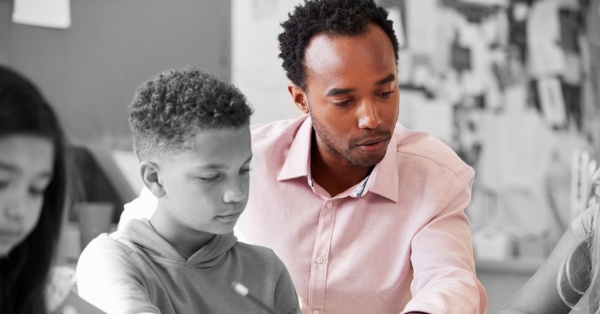
Many factors affect academic achievement in the classroom. Each student brings unique strengths, experiences, and varying degrees of support from family and the community. All of these things impact student learning.
But teacher quality has a powerful effect on student learning. When students interact with each other and with content in meaningful contexts, learning is achieved. Teachers have the potential to create these impactful learning opportunities and to nurture relationships with their students. When positive relationships have been established in the classroom, everyone is more successful.
Establishing the Optimal Learning Environment
Teachers use a variety of strategies to improve student learning, but it is most important to create a comfortable classroom where students feel secure.. Student learning is improved when teachers take the time to get to know students, to understand their needs, and to establish meaningful relationships. Here are seven strategies that have a positive impact:
Having compassion and empathy
Teachers who enjoy working with students show it, and this has a positive influence on student learning. Students who feel respected and appreciated are more willing to cooperate and more motivated to learn.
Creating a secure and dependable structure
Students respond well to the security of a structured routine. Teachers who give thought to the establishment of a developmentally appropriate classroom structure create a strong foundation for student learning to occur.
Ramping up the positive
Research suggests that when students hear more positive than negative feedback, they are more successful academically. When teachers speak conversationally, give compliments, and exchange nonverbal signals like “high fives” and “thumbs up,” a positive classroom culture is established. Corrective feedback should be constructive, but not critical. To improve student learning, effective teachers focus on the positive.
Supporting academic risk
When teachers create an atmosphere where students feel supported, they are more willing to take academic risks. By giving students the tools to encourage and support each other, they create a safe space where students will accept the challenge and stretch themselves to learn.
Teaching active listening
When teachers model good listening skills, they not only set a good example, they place importance on students’ voices. Reminding students to look at the speaker and providing opportunities to practice restating and ask clarifying questions will help students to develop this skill so critical for learning and for life.
Embedding strategy instruction
To help students build useable skills, teachers embed strategy instruction in content-area learning. These include note taking, studying, and test-taking strategies. When learned and applied in context, students more readily adopt strategies they can use again and again.
Building collaborative relationships
Learning with and from other students builds communication and social skills along with content knowledge. Modeling collaborative skills and monitoring group behavior allows teachers to guide and influence this powerful form of active learning. These skills will also prove valuable outside the classroom in future relationships and careers.
The Role of Substitute Teachers
The impact of effective teachers on student learning is well established, but what happens when teachers are absent? With students spending a significant amount of time under the care of substitute teachers throughout their K-12 education, their role must be considered. How do substitutes support the established environment of secure and trusting relationships?
To maintain the secure structure and trusting relationships which teachers work hard to nurture requires the dedication of effective, quality substitutes. A team of substitute teachers dedicated to district goals can support these relationally-based learning strategies that impact student success in the classroom. The ability to support these powerful strategies comes from building a team of quality substitutes by:
- Recruiting qualified, caring candidates who have a desire to positively impact student learning
- Training substitute teachers in research-based instructional strategies and effective classroom management
- Creating classroom experience that reinforces substitutes’ knowledge and builds both confidence and skills
- Establishing managerial relationships that support effective practice and motivate continuous improvement
- Providing ongoing coursework that improves skills and creates opportunities for professional growth
To effectively establish a pool of substitute teachers capable of supporting positive learning environments and crucial classroom relationships, many districts are partnering with educational staffing companies. As experts in the student learning space, education-exclusive staffing agencies provide every aspect of substitute teacher management.
From recruiting and training qualified candidates to mentoring and managing them long term, education staffing companies build powerful partnerships with the districts they serve. Echoing the relationships teachers work so hard to build with students, education management companies nurture relationally-based partnerships that have a positive impact on student learning.
Bring us your list, and we will help you with your search. Contact ESS with your specifications, and we will help you build a professional substitute teacher pool that raises fill rates and meets both your needs and your wants.
